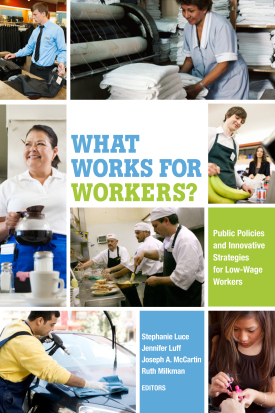Finalist for the 2016 Academy of Management's George R. Terry Book Award
“Private Equity at Work is the first comprehensive examination of private equity—its history, economic performance, and social consequences, especially for employees. The authors cast a gimlet eye on private equity’s business model, whose shortcomings are dissected with razor-sharp analysis. The material is timely and original. It includes detailed case studies as well as proposals to better regulate this invisible but omnipresent industry.
—SANFORD M. JACOBY, Distinguished Professor, UCLA
“In this brilliant new book, Eileen Appelbaum and Rosemary Batt pull back the curtain on the shadowy world of private equity and its role in the management and mismanagement of our economy. Their rigorous, balanced, and well-written study shows how inadequate government regulation, biases in the tax code, and a permissive Wall Street culture combine to put private equity financiers in charge of important American companies, often to the detriment of the long-term interests of workers, investors and the broader economy. Appelbaum and Batt develop a program of common sense policy changes that will help us tap the socially productive potential of private equity while trimming its worst excesses. This terrific book will be of interest to policymakers, students, and scholars, and should be read anyone wanting to understand why America's widely shared prosperity got derailed and how to get it back on track.”
—GERALD EPSTEIN, professor of economics and codirector, Political Economy Research Institute, University of Massachusetts Amherst
Private equity firms have long been at the center of public debates on the impact of the financial sector on Main Street companies. Are these firms financial innovators that save failing businesses or financial predators that bankrupt otherwise healthy companies and destroy jobs? The first comprehensive examination of this topic, Private Equity at Work provides a detailed yet accessible guide to this controversial business model. Economist Eileen Appelbaum and Professor Rosemary Batt carefully evaluate the evidence—including original case studies and interviews, legal documents, bankruptcy proceedings, media coverage, and existing academic scholarship—to demonstrate the effects of private equity on American businesses and workers. They document that while private equity firms have had positive effects on the operations and growth of small and mid-sized companies and in turning around failing companies, the interventions of private equity more often than not lead to significant negative consequences for many businesses and workers.
Prior research on private equity has focused almost exclusively on the financial performance of private equity funds and the returns to their investors. Private Equity at Work provides a new roadmap to the largely hidden internal operations of these firms, showing how their business strategies disproportionately benefit the partners in private equity firms at the expense of other stakeholders and taxpayers. In the 1980s, leveraged buyouts by private equity firms saw high returns and were widely considered the solution to corporate wastefulness and mismanagement. And since 2000, nearly 11,500 companies—representing almost 8 million employees—have been purchased by private equity firms. As their role in the economy has increased, they have come under fire from labor unions and community advocates who argue that the proliferation of leveraged buyouts destroys jobs, causes wages to stagnate, saddles otherwise healthy companies with debt, and leads to subsidies from taxpayers.
Appelbaum and Batt show that private equity firms’ financial strategies are designed to extract maximum value from the companies they buy and sell, often to the detriment of those companies and their employees and suppliers. Their risky decisions include buying companies and extracting dividends by loading them with high levels of debt and selling assets. These actions often lead to financial distress and a disproportionate focus on cost-cutting, outsourcing, and wage and benefit losses for workers, especially if they are unionized.
Because the law views private equity firms as investors rather than employers, private equity owners are not held accountable for their actions in ways that public corporations are. And their actions are not transparent because private equity owned companies are not regulated by the Securities and Exchange Commission. Thus, any debts or costs of bankruptcy incurred fall on businesses owned by private equity and their workers, not the private equity firms that govern them. For employees this often means loss of jobs, health and pension benefits, and retirement income. Appelbaum and Batt conclude with a set of policy recommendations intended to curb the negative effects of private equity while preserving its constructive role in the economy. These include policies to improve transparency and accountability, as well as changes that would reduce the excessive use of financial engineering strategies by firms.
A groundbreaking analysis of a hotly contested business model, Private Equity at Work provides an unprecedented analysis of the little-understood inner workings of private equity and of the effects of leveraged buyouts on American companies and workers. This important new work will be a valuable resource for scholars, policymakers, and the informed public alike.
EILEEN APPELBAUM is senior economist at the Center for Economic and Policy Research, Washington, D.C. and Visiting Professor in the Management Department, University of Leicester, UK.
ROSEMARY BATT is the Alice Hanson Cook Professor of Women and Work at the Industrial and Labor Relations School, Cornell University.



